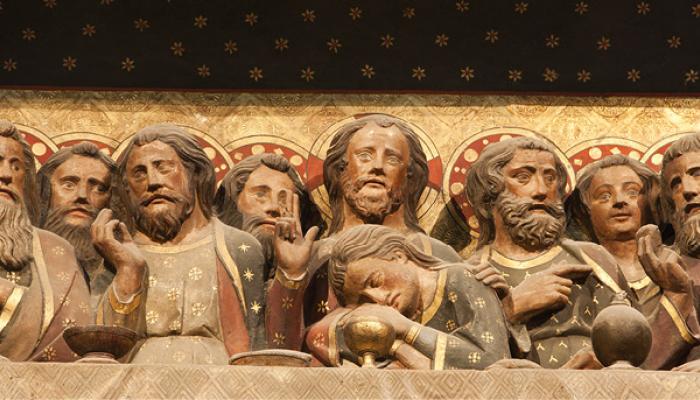
2.17 Is the pope a successor of St. Peter?
Jesus appointed the fisherman Simon Peter as the leader of the Twelve Apostles. Peter was his nickname: the Greek word petra means rock. Jesus said he would build his Church on the “rock” that Peter was called to be (Mt. 16:18-19) Mt. 16:18-19: “I tell you, you are Peter, and on this rock I will build my church, and the powers of death shall not prevail against it. I will give you the keys of the kingdom of heaven, and whatever you bind on earth shall be bound in heaven, and whatever you loose on earth shall be loosed in heaven”..
Peter and his successors were charged with leading the community of the Church. Peter’s leadership office was always passed on from one pope to the next. This means that our current pope is also a successor of the Apostle Peter.
Why did Christ institute an ecclesiastical hierarchy?
Christ instituted an ecclesiastical hierarchy with the mission of feeding the people of God in his name and for this purpose gave it authority. The hierarchy is formed of sacred ministers,; bishops, priests, and deacons. Thanks to the sacrament of Orders, bishops and priests act in the exercise of their ministry in the name and person of Christ the Head. Deacons minister to the people of God in the diakonia (service) of word, liturgy, and charity. [CCCC 179]
How is the collegial dimension of Church ministry carried out?
After the example of the twelve Apostles who were chosen and sent out together by Christ, the unity of the Church’s hierarchy is at the service of the communion of all the faithful. Every bishop exercises his ministry as a member of the episcopal college in communion with the pope and shares with him in the care of the universal Church. Priests exercise their ministry in the presbyterate of the local Church in communion with their own bishop and under his direction. [CCCC 180]
Why does ecclesial ministry also have a personal character?
Ecclesial ministry also has a personal character in as much as each minister, in virtue of the sacrament of Holy Orders, is responsible before Christ who called him personally and conferred on him his mission. [CCCC 181]
Why is the Church not a democratic organization?
Democracy operates on the principle that all power comes from the people. In the Church, however, all power comes from Christ. That is why the Church has a hierarchical structure. At the same time, however, Christ gave her a collegial structure as well.
The hierarchical element in the Church consists in the fact that Christ himself is the one who acts in the Church when ordained ministers, by God’s grace, do or give something that they could not do or give by themselves, in other words, when they administer the sacraments in Christ’s place and teach with his authority. The collegial element in the Church consists in the fact that Christ entrusted the entire faith to a group of twelve apostles, whose successors govern the Church, with the pope, the Petrine ministry presiding. Given this collegial approach, councils are an indispensable part of the Church. Yet even in other administrative bodies of the Church, in synods and councils, the manifold gifts of the spirit and the universality of the Church throughout the world can be fruitful. [Youcat 140]
What is the mission of the pope?
The pope, bishop of Rome and the Successor of Saint Peter, is the perpetual, visible source and foundation of the unity of the Church. He is the vicar of Christ, the head of the College of bishops and pastor of the universal Church over which he has by divine institution full, supreme, immediate, and universal power. [CCCC 182]
What is the pope’s responsibility?
As successor of St. Peter and head of the college of bishops, the pope is the source and guarantor of the Church’s unity. He has the supreme pastoral authority and the final authority in doctrinal and disciplinary decisions.
Jesus gave Peter a unique position of preeminence among the apostles. This made him the supreme authority in the early Church. Rome - the local Church that Peter led and the place of his martyrdom- became after his death the internal reference point of the young Church. Every Christian community had to agree with Rome; that was the tandard for the true, complete, and unadulterated apostolic faith. To this day every bishop of Rome has been, like Peter, the supreme shepherd of the Church, whose real head is Christ. Only in this capacity is the Pope “Christ’s Vicar on earth”. As the highest pastoral and doctrinal authority, he watches over the transmission of the true faith. If need be, he must revoke commissions to teach doctrine or relieve ordained ministers of their office in cases of serious failures in matters of faith and morals. Unity in matters of faith and morals, which is guaranteed by the Church’s Magisterium, or teaching authority, with the Pope at the head, is one reason for the remarkable resilience and influence of the Catholic Church. [Youcat 141]
For, if the order of succession of bishops is to be considered, how much more surely, truly and safely do we number them from Peter, to whom, as representing the whole Church, the Lord said: 'Upon this rock I will build my church and the gates of hell shall not prevail against it' (Mt. 16:18). For, to Peter succeeded Linus, to Linus Clement, to Clement Anacletus, to Anacletus Evaristus... [St. Augustine, Letters, No. 53 (ML 33, 196)]





